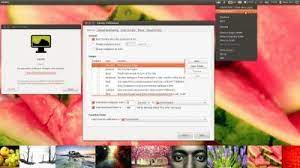Ready For A Little Variety?
A Guide to Variety Wallpaper Changer
The default wallpaper rotation setting on your Ubuntu system may quickly become dull. Seeing the same backgrounds day in and day out can be uninspiring. This is where Variety, an open-source wallpaper changer, comes to the rescue. It’s a versatile tool that provides a breath of fresh air to your desktop. In this guide, we’ll show you how to install, configure, and make the most of Variety.
Installing Variety Wallpaper Changer
Variety can be installed easily on Ubuntu. You have two primary methods to choose from: using the graphical Software application or the command line. Let’s go through both options:
Graphical Installation (Software Application)
1. Open the Software application: You can access it from your Applications or Show Applications menu. It’s represented by a shopping bag icon.
2. Search for Variety: Click the ‘Search’ icon in the top left corner and type ‘Variety’. The Software application will display relevant search results.
3. Select Variety Wallpaper Changer: When you see the Variety Wallpaper Changer icon, click on it.
4. Install Variety: On the Variety page, click the 'Install' button. You may be prompted to enter your password to authorize the installation. This is standard for installing software on Ubuntu.
5. Wait for Installation: The Software application will download and install Variety. The progress bar will indicate the installation status.
6. Launch Variety: Once installed, you can launch Variety directly from the Software application or by searching for it in your applications.
7. Enjoy Variety: Variety will now start running and will be accessible from your system tray. You can find its settings in the system tray menu or through the Launcher. You can access its configuration options by right-clicking on its icon.
Command Line Installation
If you prefer the command line, you can install Variety using the Terminal. Open your Terminal and enter the following commands:
sudo apt update
sudo apt install variety
You will be prompted to enter your password to authorize the installation. Once the installation is complete, you can launch Variety from your Applications or Show Applications menu. It will be available for customization and use.
Also: Download and Install Now
Configuring Variety
With Variety installed, it’s time to tailor it to your preferences:
1. Accessing Preferences: Right-click on Variety’s system tray icon and select “Variety Preferences.” This opens the preferences window where you can configure Variety.
2. General Tab: The General tab is where you can configure how Variety works. You can enable or disable it, choose the wallpaper change interval, and more. Here is where you can select download of images from the Internet or choosing images you have on your computer.
3. Wallpaper Tab: In the Wallpaper tab, you can choose the wallpaper source, position, and effects.
4. Quotes Tab: The Quotes tab allows you to configure how quotes are displayed on your desktop. You can enable or disable this feature and customize the appearance of the quotes.
5. Clock Tab: In the Clock tab, you can add a clock to your desktop and customize its appearance.
6. Downloading Tab: Configure where Variety downloads wallpapers from the web in the Downloading tab. You can select the source websites and frequency for downloads, as well as automatically watching your clipboard for known image URLs.
7. Filtering Tab: Use the Filtering tab to filter wallpapers based on resolution, orientatin, ,image colour and EXIF rating.
8. Customize Tab: The Customize tab lets you customize the appearance of Variety, including icon themes and icons. You can also have your wallpaper reflected on the login screen.
9. Tips Tab: In the Tips tab, you can read the author's tips on how to make the most of Variety. Helpful links are also available at the bottom of this tab.
10. Changelog Tab: The Changelog tab provides information about the current version and recent changes to Variety. The links from the previous tab are also available here.
11. Donate Tab: If you find Variety useful, consider supporting its author, Peter Levi, by making a donation. Your support will go a long way in helping to maintain and enhance this open-source project for the benefit of the community.
Using Variety Wallpaper Changer
Variety is quite intuitive to use. After you've configured your preferences, Variety runs silently in your system tray. It periodically changes your wallpaper according to the settings you've specified. You can access the system tray menu by clicking on Variety's icon.
From the system tray menu, you can:
- Skip to the next wallpaper: Right-click the icon and select “Next wallpaper.”
- Pause wallpaper changing: Select “Pause” if you want to keep the current wallpaper.
- Access the Preferences: Right-click and select “Variety Preferences” to make any adjustments.
- Exit Variety: If you want to stop using Variety temporarily, you can select “Exit.”
Variety also displays quotes on your desktop. These can be disabled in the preferences if you prefer a more minimalistic wallpaper-only experience.
Where to Get Wallpapers
Variety can fetch wallpapers from various sources. By default, it uses the images from your local collection. However, you can choose to download wallpapers from a wide variety of online sources. For instance, you can set it to retrieve wallpapers from Flickr, Wallhaven, and many other websites.
Giving Back
If you're thrilled by Variety and want to express your appreciation for this fantastic tool, you can donate to the developer. Your support will go a long way in helping to maintain and enhance this open-source project for the benefit of the community.
See you next Tuesday!














